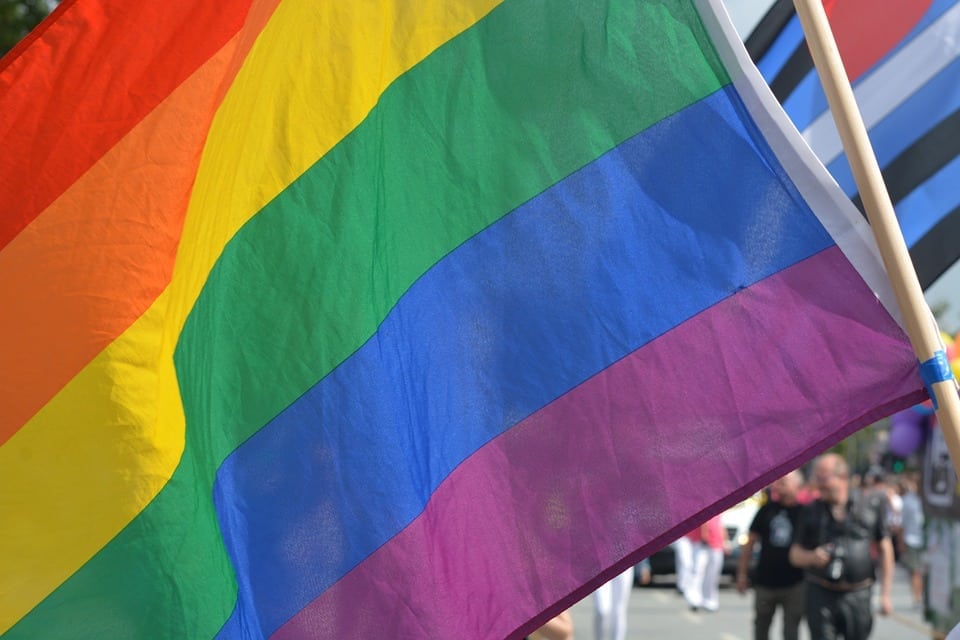Marsha P. Johnson and Sylvia Rivera were trans women of color who paved the way for the LGBTQ+ rights movement, starting with the Stonewall riots on June 28th 1969, which led to the celebration of Pride we know today. With their determined activism and drive to support and uplift their community, Sylvia and Marsha were powerful and pivotal voices in LGBT+ liberation. (Note that Marsha was a self-identified drag queen, who also “referred to herself as a “transvestite,” and never used “transgender” to describe her gender identity at the time, since the term was popularized after her death in 1992″.)
The Stonewall Uprising
Police brutality was at the center of the uprising in 1968: drag queens and queer people were tired of being arrested, beaten, and murdered by the police with impunity. When police raided Stonewall that June, the tensions reached a tipping point. As police escalated aggression against Stonewall’s patrons, the crowd and bystanders fought back against the growing violence and injustice – both that night and against their community as a whole.
Marsha Johnson and Sylvia Rivera
Sylvia and Marsha were among many drag queens and trans people who rose up with the first throws of bricks and molotov cocktails, demanding liberation and the end of police brutality against their communities. These women became centerpieces in the movement and co-founded Street Transvestite Action Revolutionaries, or STAR, a radical queer collective that housed homeless queer youth, trans people, and sex workers in lower Manhattan. Both were prominent voices in the LGBT activist movement despite facing discrimination from many gay rights organizations (predominantly led by white cis-men at the time) that did not recognize the role of transgender people or people of color in the movement.
The First Pride Parades
While drag queens and trans women were the initial leaders of the gay rights movement, they were quickly pushed to the sidelines and ostracized by the very community they had fought for. On the one year anniversary of the Stonewall uprising, on June 30, 1970, the first Pride parades (then marches) were held in New York City, Los Angeles and Chicago, where drag queens marched alongside their fellow activists. Yet at the 1973 Pride parade, organizers tried to bar both Marsha and Sylvia, who had spoken at the front lines of the movement for years, from speaking or even attending, citing that drag queens were “giving them a bad name”, and banning them from the march entirely.
After defiantly attending and marching at the front of the parade, Sylvia finally got the mic at the stage of the event. She rightfully called attention to the fact that the movement had shifted to become less inclusive and supportive, pointing out how gay men and women had turned their backs on the trans street people who sacrificed their lives for the progress they now enjoyed. She was booed off stage. After this incident, Rivera attempted suicided and her life was saved by Marsha, who found her. Sylvia left the movement and spent the rest of her life in the suburbs.
Leaving a Legacy of Activism
After Sylvia left the movement, Marsha stayed in NYC as an activist, spreading peace and offering a safe haven to street people through STAR. In 1992, she was found dead. Police quickly ruled her death a suicide and refused to investigate further, however, the wounds on her body and threats made on Martha’s life before her death suspect many to believe she was murdered. An investigation of her death was never opened, despite attempts by the Anti-Violence Project to re-open the case.
Sylvia and Marsha both put their lives on the line to advocate for the LGBTQ+ community and usher in an era of liberation, freedom, and celebration for millions of LGBTQ people. While Pride is a joyous celebration of our community and progress, it is also a call to continue to advocate for LGBTQ+ rights and protect our communities. Even today, vast discrimination still exists, and trans people, specifically Black trans women are still regularly murdered by police and civilians alike at disproportionately high rates at epidemic levels. We must never commemorate pride without remembering the Queens who fought to give it to us and continuing to honor their legacy and the original activist roots of the movement.


